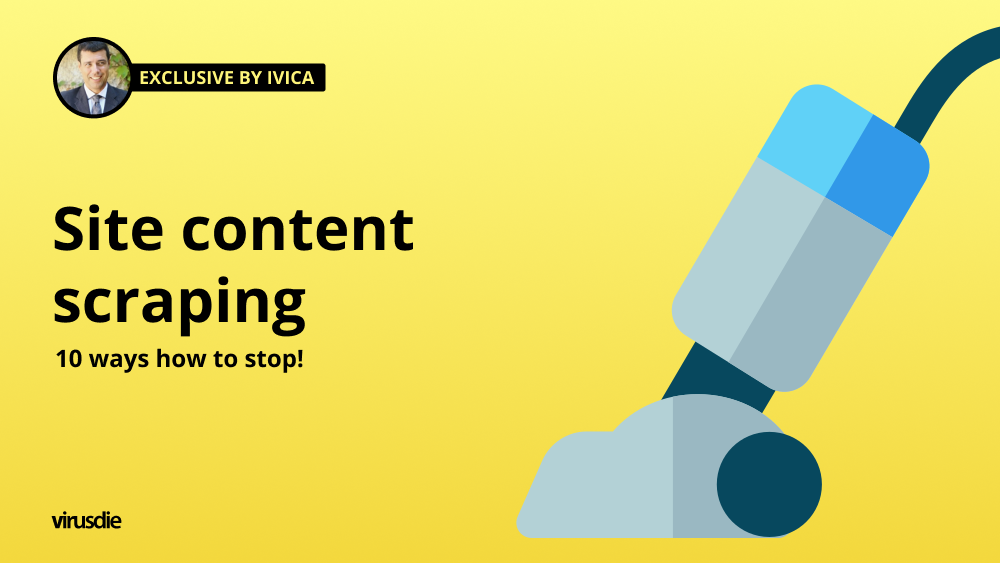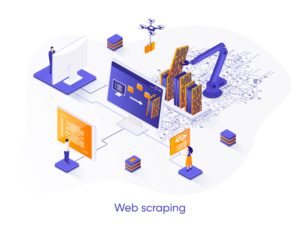
Exclusive by Ivica | 10 ways how to stop website content scraping.
What is web scraping? The term scraping literally means “to scrape”; in the context of the Web, it refers to a technique of searching, extracting, structuring, and cleaning data to publish information contained in formats of the Web environment that cannot be reused, such as tables created in HTML (a different type of scraping than Web is used to capture data from PDF).
The goal of web scraping is to convert the unstructured data we are interested in on a website into structured data that can be stored and analyzed in a local database or spreadsheet. The best thing about this technique is that you do not need to have any prior knowledge or programming skills to use it.
Web scraping is probably one of the most popular forms of snooping on other websites’ content, but is it legal?
As of 2021, about 23 percent of all Internet traffic is generated by Internet-scraping robots that collect data, run social media campaigns, and test the performance of apps for real businesses. Recently, with the advent of the pandemic, these practices have become common among large corporations and small and medium-sized businesses.
However, at the same time, malicious actors also started to use web scraping technology as a tool to perform various forms of online fraud. A staggering 29 % of Internet traffic is comprised of malicious bots executing DDoS attacks, grabbing personal information, and testing for security vulnerabilities on the Web. 
The fraudsters need to obtain large quantities of personal data from the user before they can retrieve the account, commit new account fraud, or engage in similar crimes – data that can be obtained by scraping the web.
The fact that proxy providers have access to this technology always poses the risk that fraudsters might find these companies a very attractive place to operate.
How do people scrape content?
This data is often used for a variety of purposes, including targeted advertising, business intelligence, product management, and artificial intelligence. However, due to its ubiquity and cross-platform access, regulation of the web scraping industry still hangs in the balance.
The controversial interference of the consulting firm Cambridge Analytica in the 2016 US election triggered increased scrutiny of the web scraping industry. The firm is accused of collecting raw data from over 87 million Facebook users. Data allegedly used by the company was used to support President Donald Trump’s presidential campaign in 2016. Though no criminal charges have been filed, the scandal has heightened public awareness of privacy concerns.
This became a watershed moment in the regulation of the turn and data collection industry.
Despite a generally held belief that unregulated data collection can negatively impact Internet users, there is some merit in ethical data scraping practices. As the Internet is known today, it is one of the vital pillars.
In order to provide a personalized user experience, e-commerce and music streaming companies seek to collect and analyze data about their users’ habits. By using it, search engines are able to deliver relevant search results as needed. As a result, machine learning and artificial intelligence have also made great strides.
Yet critics claim that web scraping does not currently have a uniform international law or active regulation. Due to this, companies aren’t protecting user data enough from malicious actors.
The impact of Content Scraping
Content Scraping, on the other hand, is always bad, and it is the extraction of information from a website with or, more often than not, without the consent of the website owner. While scraping can be done manually, robots tend to be more efficient than humans.
In most cases, scraping websites is done maliciously. And of course, there are a few scraping techniques you should combat: the consequences on your server are often very painful, the website is slow, very slow, and in some cases your website can become inaccessible. Faced with counterattacks from website owners, scraping robots have modernized, learned to be more discreet, respect your bandwidth … The fact remains that they can continue to pillage your content with impunity.
What you can expect:
• Plagiarized content
• Loss in SEO rankings
• Bad user experience
• Distorted analytics
• Infrastructure strain and downtime
How to catch content scrapers?
You can search Google for them and then contact Google to remove the scrapers. You can also use Google Webmaster Tools to track the crawlers that are indexing your site and opt out of them. You can also set up alerts with Google so you know in real time when content scrapers are checking your site.
Preventing web scraping: best practices for keeping your content safe
1. Do not display sensitive information on your site
It may sound obvious, but this is the first thing you should do if you are really worried about your scrapers stealing your data. Webpage scraping is simply a method of automating access to a particular website. It may not be necessary to worry about scrapers if you’re sharing your content with everyone visiting your site.
The world’s largest scraper is Google. When Google indexes a website’s content, it seems to not bother anyone. It may be a good idea not to leave it there, if you are concerned it will fall into the wrong hands.
2. Put Copyright warning against content scraping on the website
Tell people not to scrape, and many will respect it. Copyright is the exclusive right to produce or reproduce a work or any substantial part thereof in any material form. All original works of literature, drama, music, and art are protected by copyright.
3. Restrict the flow for individual IP addresses
Most likely, the person using that computer to make thousands of requests on your site is scraping your content. One of the first steps websites take to stop website scrapers is to block requests from computers that are overloading the server.
If you use a proxy service, VPN, or corporate network, all outgoing traffic will appear to come from one IP address, so you could unintentionally block the connections of many legitimate users through that device.
Finally, scrapers can slow down and wait their robot between requests and act as a legitimate user.
4. Using CAPTCHA
By posing problems that are easy to solve but difficult to solve for computers, CAPTCHAs are used to tell humans from computers.
For humans, these problems are easy to solve, but also extremely annoying. CAPTCHAs can be useful, but should be used sparingly. If a visitor is making dozens of requests per second, offer them a CAPTCHA, perhaps explaining that their activities are suspicious. You do not need to reach all visitors …
5. Create a “Honeypot” page
A technique I like a lot: honey pots (literally pots, or inviting pages) are pages that a human visitor would never go to. A robot tasked with clicking on any link on the page may come across it.
For example, the link may be configured as display: none; in CSS, or written in white font on a white background to blend in with the background of the page.
It is reasonable to assume that an IP visiting a fraudulent page is not a human visitor, and to restrict or block all requests coming from that client.
6. Require login for access
HTTP access is a fundamentally stateless protocol, which means that no information is stored from request to request, even though most HTTP clients (such as browsers) tend to save session cookies as well. In other words, scrapers need not identify themselves to access public sites.
A scraper must, however, send credentials (session cookies) to verify content if the site is protected by an identifier, which can then be tracked to identify the scrapers.
You won’t be able to stop scraping with this technique, but you will at least gain some insight into who is accessing your content.
7. Embed information in media objects
Most network scrapers are satisfied with extracting a text string from HTML files.
In case your site’s content is in an image, movie, PDF, or other format other than text, you have just made the scraper task much more difficult: analyzing the text of an object is not done in sequence.
The big downside is that this can slow down site loading, accessibility for blind (or otherwise disabled) users will be reduced, and content could be updated more difficultly. Not to mention that Google does not like it.
8. Your hosting provider may provide bot and scraper protection
Check with your hosting provider if they could provide you with sufficient protection. That is very important and you can call it one of the first steps.
9. Put affiliate links with keywords
There are few plugins for WordPress like Thirsty Affiliates that will automatically replace keywords with your affiliate links.
10. Take a Legal stand
Find a lawyer and fill a complaint to search engines (DMCA Takedown). Using this strategy, you simply contact the scrapper and request that your content be removed. If the scraper refuses to cooperate, then you file a DMCA (Digital Millennium Copyright Act) complaint with their web host.
BONUS Tip and Trick how to prevent scrapping
Web Application Firewall (WAF) blocks requests that try to scrape your content.
Website firewall (Web Application Firewall) from Virusdie protect your website not only from content grabbing/scraping, but also from hackers, malware, attacks, XSS/SQL injections, malicious code uploads, suspicious activities, and blacklisting.
Any measures you take to limit web scrapers will likely affect the user experience as well. Whenever you post information on your public review site, ensure that it’s accessible quickly and easily. The problem is that it will not only be suitable for your visitors, but also for scrapers. There are some solutions presented here that can help you combat some of the most harmful scrapers, but not all of them are ideal. But it will be virtually impossible to eradicate all scrapers!
———
Article by Ivica Delic
founder of FreelancersTools,
exclusively for Virusdie.
Join our private Facebook group to get help from other security experts, and share your own web security experiences and expertise. Group members receive exclusive news and offers. They can also communicate directly with the Virusdie team. Join us on Facebook.

Comments